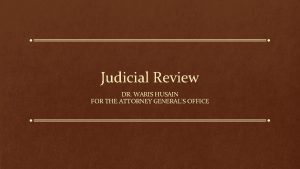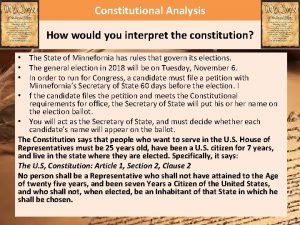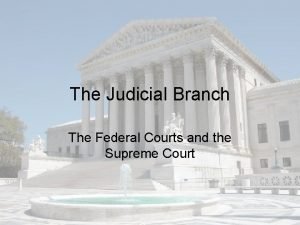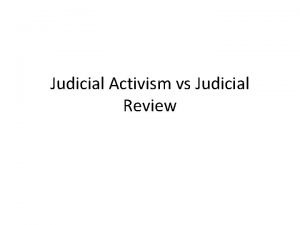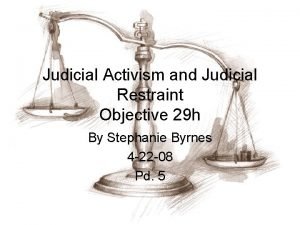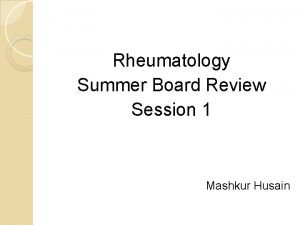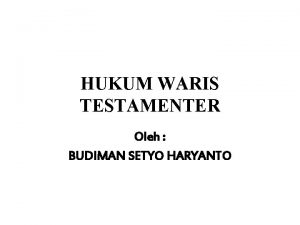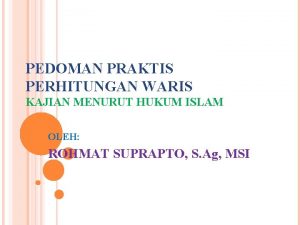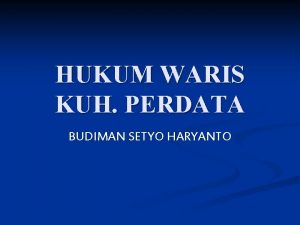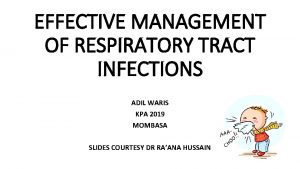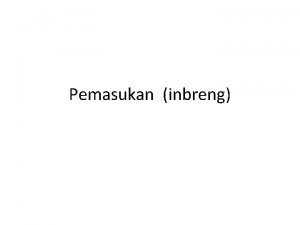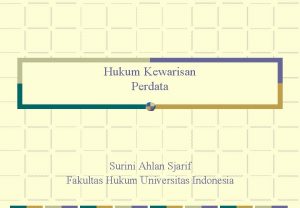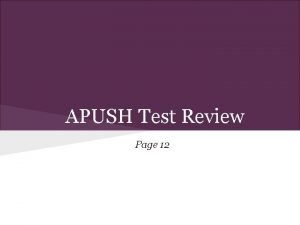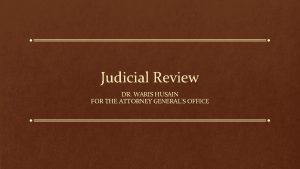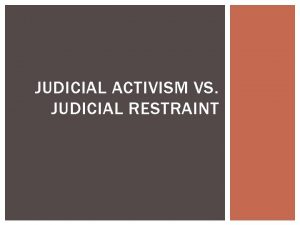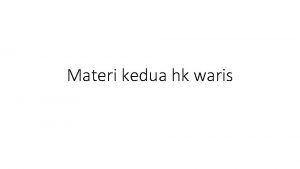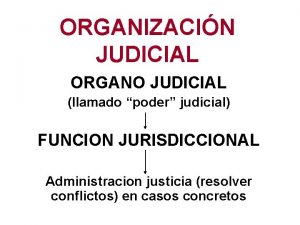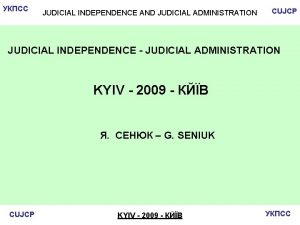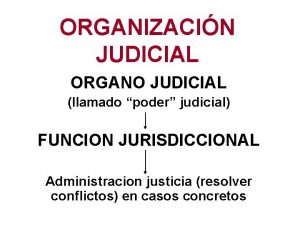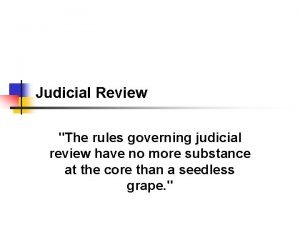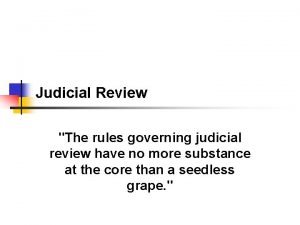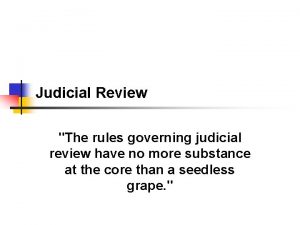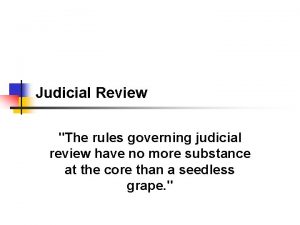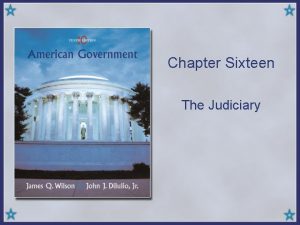Judicial Review DR WARIS HUSAIN FOR THE ATTORNEY





















- Slides: 21

Judicial Review DR. WARIS HUSAIN FOR THE ATTORNEY GENERAL’S OFFICE


Early history of Judicial Review • Chief Justice Lord Coke in Dr. Bonham’s Case, 1610 • “And it appears in our books, that in many cases, the common law will control Acts of Parliament, and sometimes adjudge them to be utterly void; • for when an act of Parliament is against common right and reason, or repugnant, or impossible to be performed, the common law will control it, and adjudge such an Act to be void…”

Early history of Judicial Review • Chief Justice Lord Coke in Dr. Bonham’s Case, 1610 • “And it appears in our books, that in many cases, the common law will control Acts of Parliament, and sometimes adjudge them to be utterly void; • for when an act of Parliament is against common right and reason, or repugnant, or impossible to be performed, the common law will control it, and adjudge such an Act to be void…”

Early history of Judicial Review Federalist Papers 78: Alexander Hamilton- It, therefore, belongs to the Court the right to ascertain the constitution’s meaning, as well as the meaning of any particular act proceeding from the legislative body.

U. S. Judicial Review • The court’s right to review actions of executive agencies and Congress is NOT in the constitution, why? • The perception of lawyers during colonial era. America was very negative. • Court was given narrow and limited powers in the Constitution to limit the power of judges and lawyers- vesting real powers in Congress and President.

Major U. S. Judicial Review Cases • Marbury v. Madison- Appointment of judges by the President. • "It is emphatically the province and duty of the judicial department to say what the law is. Those who apply the rule to particular cases, must of necessity expound and interpret that rule. If two laws conflict with each other, the courts must decide on the operation of each. "

U. S. Judicial Review Cases: Federalism • Gibbons v Ogden: 1824 • Ogden held a New York State license allowing him to operate a ferry across the Hudson between New York and New Jersey. Gibbons received a Federal license and claimed that his license superceded that of Ogden. • The court ruled that Gibbon's federal license took precedence over that of Ogden because the federal government was given the power to regulate interstate trade.

Judicial Review: Federalism Cases • Mc. Culloch v Maryland: 1818 • Angered by the existence of the new Federal bank, the state of Maryland decided to tax the bank. Mc. Culloch, a cashier for the bank refused to pay the tax claiming. The Supreme Court affirmed that a state had no power or right to tax the federal government. This precedent established the superiority of the federal government.

Judicial Review: Federalism Cases • Murphy v. National Collegiate Athletic Association: 2018 • Professional and Amateur Sports Protection Act, a federal law that banned states from legalizing sports betting, thus giving oversight of gambling to the individual states. • The issue was whether the U. S. federal government has the right to control state lawmaking. • . Justice Samuel Alito, in writing the majority opinion, stated that PASPA “unequivocally dictates what a state legislature may and may not do. … State legislatures are put under the direct control of Congress. It is as if federal officers were installed in state legislative chambers and were armed with the authority to stop legislators from voting on any offending proposals. A more direct affront to state sovereignty is not easy to imagine. ”

Judicial Review: Federalism Cases • South Dakota v. Wayfair, Inc. , 585 U. S. ___ (2018), INTERNET SALES AND FEDERALISM • A United States Supreme Court case in which the court held by a 5 -4 majority that states may charge tax on purchases made from out-of-state sellers, even if the seller does not have a physical presence in the taxing state.



Comparative View

Founders’ Envisioned Role for the Judiciary Constitution U. S. of Pakistan of India Constitution Types of Original, Very Limited Jurisdiction Appellate & Original & Advisory Appellate Judicial Expansive Limited Review Powers

Founders’ Envisioned Role for the Judiciary Constitution of Pakistan Constitution of India U. S. Constitution Types of Jurisdiction Original, Appellate & Advisory Very Limited Original & Appellate Judicial Review Powers Expansive Limited Jurisdictional Clause Article 184 - The Supreme Court shall…have original jurisdiction in any disputes between any two or more governments and cases that the Court considers pose a question of public importance with reference to the enforcement of any of the Fundamental Rights. Article 32 - The right to move the Supreme Court by appropriate proceedings for the enforcement of the (fundamental constitutional rights) rights conferred by this Part is guaranteed. Article 3, Section 2 - Judicial power of the Supreme Court shall extend to cases involving: treaties, ambassadors, maritime jurisdiction, controversies between states and their citizens, controversies between a citizen of the United States and a foreign state

Justiciability Standards & Procedures Pakistan Standards for - Matter of public the exercise importance of judicial review - For the “enforcement of a fundamental right” - Public interest litigation sets aside standing requirements - Supreme Court Chief Justice exercises suo motu powers to call parties to the court India - Matter of public importance United States - “Case or Controversy” - For the “enforcement of a fundamental right” - Standing - Public interest litigation sets aside standing requirements - Sufficient Interest Test - Ripeness & Mootness - Political Question Doctrine

Justiciability Standards & Procedures Pakistan India Standards for - Matter of public importance the exercise of judicial - For the “enforcement of a review fundamental right” United States - “Case or Controversy” - Standing - Public interest litigation sets aside - Ripeness & Mootness aside standing requirements - Supreme Court Chief Justice - Sufficient Interest Test - Political Question Doctrine exercises suo motu power Procedure No formal case-selection procedure, most applications must be heard by a 2 -judge bench - Two days per week Court meets to - One day per week the Court conduct admissions hearings. meets to determine which cases Admission hearings. The Court can 1) will be granted hearings through dismiss the petition for lack of merit, writ of certiori. 2) issue a summary disposition with a final order, - Rule of Four applies where if 3) or refer the matter for oral hearing four justices agree the case before another bench as a “regular presents a justiciable issue, it is matter. ” scheduled to be argued before the Court.

Justiciability Statistics Pakistan India United States Number of Justices 19 31 9 Petitions Per Year 18, 000 47, 000 - 8, 000

Justiciability Statistics Pakistan India United States Number of Justices 19 31 9 Petitions Per Year 18, 000 47, 000 - 8, 000 Current Backlog of Cases 23, 000 64, 000 0

Justiciability Statistics Pakistan India United States Number of Justices 19 31 9 Petitions Per Year 18, 000 47, 000 - 8, 000 Current Backlog of Cases Percentage of Hearings Granted 23, 000 64, 000 0 Most petitions are scheduled for hearings. 15 - 26% 1%
 Waris husain
Waris husain Constitution
Constitution Judicial restraint
Judicial restraint Jusicial restraint
Jusicial restraint Judicial restraint vs judicial activism
Judicial restraint vs judicial activism Judicial activism vs restraint
Judicial activism vs restraint Mashkur husain md
Mashkur husain md Miss fatima husain
Miss fatima husain Ashraf husain
Ashraf husain Ashraf husain
Ashraf husain Ahli waris testamenter
Ahli waris testamenter Ahli waris ashabah adalah
Ahli waris ashabah adalah Waris
Waris Inbreng waris adalah
Inbreng waris adalah Dr adil waris
Dr adil waris Waris dirie son aleeke
Waris dirie son aleeke Hukum waris barat
Hukum waris barat Apa itu inbreng
Apa itu inbreng Jadual pembahagian harta pusaka
Jadual pembahagian harta pusaka Hukum waris barat
Hukum waris barat Waris dirie aleeke
Waris dirie aleeke Kitchen cabinet apush
Kitchen cabinet apush
